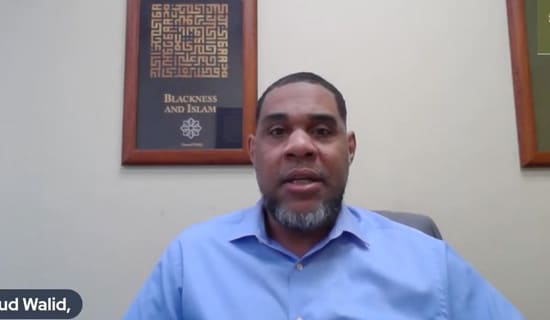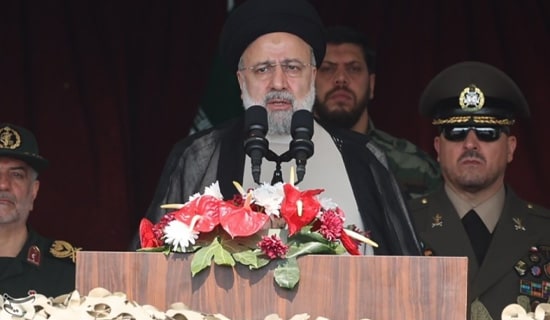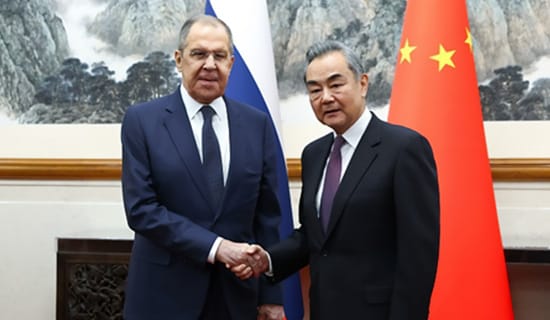In an interview with the independent Iraqi news agency Aswathura, Iranian Grand Ayatollah Mohammad Hussein Montazeri, one of the founders of the Islamic Revolution in Iran, gave his views on the current Iranian regime and the challenges it faces.
Grand Ayatollah Montazeri had been designated by Ayatollah Ruhollah Khomeini as his successor, but the appointment was withdrawn in 1988, after Montazeri criticized the regime's repression and violation of human rights. In 1997, Ayatollah Montazeri was put under house arrest for six years by Iran's Supreme Leader Ali Khamenei, for his criticism of Khamenei's absolute rule.
According to Ayatollah Montazeri, the rule of the jurisprudent ( "velayat-e faqih") should be limited to the function of advisor to the rulers, who are elected by the people without violating Islamic principles. Montazeri asserts that the rule of the jurisprudent should not be an absolute rule, as is currently the case under Iran's Supreme Leader Ali Khamenei.
In the interview, Ayatollah Montazeri argues that the Iranian regime represses the people's freedom of speech and freedom to elect leaders, and does not permit normal political life as promised by the leaders of the Revolution. He calls for establishing relations with the U.S. in order to solve the nuclear crisis.
Like many of Iran's leaders, Montazeri too sees Israel as the root of Iran's international-relations problems.
Despite his ostracism by the regime, Montazeri was and remains a "faithful son of the Islamic Revolution," and in the interview he reiterates the fundamental principles of the Revolution as laid out 27 years ago: independence, liberty, and the Islamic Republic.
In the interview, Montazeri explains the circumstances in which he left the center of power in Tehran and moved to the city of Qom. At first there was no disagreement between him and Ayatollah Khomeini, and he was elected to the Assembly of Experts as a representative from Tehran, in order to participate in drafting the constitution. He explained that once the constitution had been drawn up, he had asked Ayatollah Khomeini to be allowed to return to Qom and to continue his studies and research. Montazeri claims that at that point there was no need for his presence in Tehran, since the temporary government, headed by Mehdi Bazargan and his ministers, were managing the affairs of state, and he returned to teaching in the religious center of Qom.
In accordance with his interpretation of the principle of "the rule of the jurisprudent," he fulfilled the role of advising the rulers.
However, Montazeri does not talk about the period following the Bazargan government, which resigned in November 1979; nor does he discuss the period leading up to his removal as successor to Ayatollah Khomeini.
The following are excerpts from the interview: [1]
"Party Leaders are Summoned to Court, and Pressured and Threatened"
In answer to a question about the faults he finds in the current government, Montazeri replied: "Before and during the Islamic Revolution, the people's slogan, which Imam Khomeini as well as ourselves (the clerics) presented to the public, was 'independence, liberty, and the Islamic republic.'
"[This slogan] stemmed from the fact that in the days of the Shah, foreign governments would brazenly interfere in the country's affairs... The people were not free to express their opinions, and the Islamic checks and balances were violated.
"'Independence' meant non-interference by other countries in Iranian policy. 'Liberty' meant that people would be free to express themselves. 'The Islamic republic' meant that the government would be popular and elected by the citizens, and that it would implement the Islamic checks and balances.
SUPPORT OUR WORK

"This was the slogan of the people, and Ayatollah Khomeini [and we,] the clerics, assured the public [that it would be implemented] - but our wishes were not fulfilled.
"'Republic' means that the citizens are the foundation of the government and that the politically aware have the right to have political parties [from which to choose]. It is these parties that should form governments, oversee the government and the regime, and express opposition.
"Now, however, party leaders are summoned to court and pressured and threatened, while the parties should be overseeing the government's activities, and criticizing it and forming opposition to it. In practice, it is the government that is disrupting the parties' affairs."
The Rulers Say: We Have No Need for Parties, The Mosques are Our Parties... The Elections are a [Mere] Formality, and If a Citizen Expresses Dissent, He is Subject to Persecution
"If we want a truly popular government, then the elites of society, and those possessing political thought and awareness, must independently establish parties - parties that will be able to form and oversee a government. But this is not happening. The rulers say: We have no need for parties; the mosques are our parties. That is, if somebody speaks in a mosque, what he says takes on the aura of religious law, and he motivates the people to go and vote for so-and-so and do such-and-such.
"This is wrong. If we want a popular government, people must have a genuine role in forming and maintaining it. They need to oversee [the government], provided that they do not overstep the law or the principle of 'the rule of the jurisprudent' that is laid out in the constitution. [The ruling jurisprudent] must ensure that the government does not stray from the Islamic checks and balances. He should not be the absolute ruler who controls everything.
"For this reason, the administration must be given to the public and to the political elites, by way of the parties... To date, the parties have not been allowed to play their part. Temporary parties are formed and elections are conducted as a [mere] formality, and promises are given - and if a citizen expresses dissent, he is subject to persecution..."
In Iran... The Security Services and the Army Have the Last Word... The Opinion of the Citizens Should Be the Deciding Factor - Not the Opinion of the Military
"The promises made to people by Ayatollah Khomeini and others did not bring the desired results. For instance, in Turkey, we see that the president of the republic is elected by the people, and the prime minister and the government carry out their roles. But we see that in sensitive circumstances it is the army that has the last word.
"This is the situation in Iran [as well], and the security services and the army have the last word, and they interfere in political matters."
Ayatollah Montazeri added: "The citizens should have the last word, and even in sensitive circumstances it should be the citizens' opinion that is the deciding factor, and not the opinion of the military."
"If the U.S. or Europe Wants to Force Iran to Relinquish Nuclear Energy for Peaceful Purposes - That is Meddling in Iran's Affairs"
Regarding the nuclear crisis, Montazeri said: "One of the foundations of the Islamic Revolution is 'independence,' meaning that the Iranian government must act in accordance with the interests of its [own] society.
"If the U.S. or Europe wants to force Iran to relinquish nuclear energy for peaceful purposes - that is meddling in Iran's affairs. Attention should be paid to the nature of the dispute, and that it be [conducted] far from the hysteria that leads to a clash - provided that the country and the citizens are not hurt."
Montazeri noted, "One of the ways of dealing [with the crisis] is to conduct a diplomatic dialogue. There is no obligation to establish ties with the U.S. at any given moment. But the question now is what is holding back the forming of [such] ties - so that the problem could be resolved in a peaceful manner, and a way out could be found without a clash between the two sides.
"At the same time, if America tries to force its power on Iran so as to deprive it of the use of nuclear energy for peaceful purposes, it would be a deceit [sic] - because knowledge and technology are not a monopoly but the right of all people.
"How can Israel have nuclear energy, and even nuclear weapons, but we, who don't want [nuclear] weapons - why can't we have nuclear energy for peaceful purposes?..."
The Takeover of the American Embassy was Wrong; Iran Should Establish Good Relations With America [Based on] Mutual Respect
"It is the right of every Muslim to benefit from technology. The Prophet Muhammad said: 'Seeking knowledge is the obligation of every Muslim'... Therefore, the quest for science is the obligation of every Muslim, whether it be religious or secular science, since our world today is knowledge based.
"If the Americans tell [us] not to approach this knowledge and not to study it, then this is wrongful, and the people will not accept it. As I said, we need to work to remove the lack of confidence between the sides, and to act [to establish] good relations and mutual respect between [Iran and the U.S.]...
"The use of force and compulsion against Iran is wrong. People won't accept this, and the Americans are making a mistake when they force their opinion [on us].
"In our world, there is no place for the forces of calumny. Therefore, we need to solve the problem by peaceful [means]. We need to establish relations or send intermediaries, instead of Bush saying anti-Iran slogans in the U.S. and us saying anti-Bush [slogans] in Iran.
"The takeover of the American embassy in Iran was wrong, and we should correct this mistake, establish relations, and solve the problem by peaceful means."
If America Wants to Attack Iran, This Would Be a Mistake... [America] Too is an Heir to Imperialism and is One of the Imperialists
With regard to a potential U.S. attack on Iran and to how the Iranian government and its people should respond, Montazeri said: "If the U.S. wants to attack Iran, that would be a mistake, especially since they attacked Afghanistan and Iraq, and at present they are suffering problems - especially in Iraq, which has turned into a quagmire for the Americans. Iran is not weaker than Iraq...
"When [various] peoples suffered from British and Soviet imperialism, America was seen as their savior - but unfortunately, when it came, it proved that it too is an heir to imperialism and is one of the imperialists.
"If America attacks Iran, this will definitely hurt it [i.e. America], since the [Iranian] people is mobilized against it. Our world today is not a world of war and attack. A knot that can be undone by hand need not be undone with the teeth..."
Israel is an Obstacle to Our Relations With Other Countries
"There are some difficulties [in our relations with Turkey], and I would like to ask the Turkish government: [Why do you have] relations with Israel? For indeed, Israel is a usurper government, that conquered the Palestinians' lands and made them refugees. If not for Israel, we would have no problem with other countries."
[1] http://www.aswathura.com/aswat/details.asp?id=2913. May 22, 2006.




